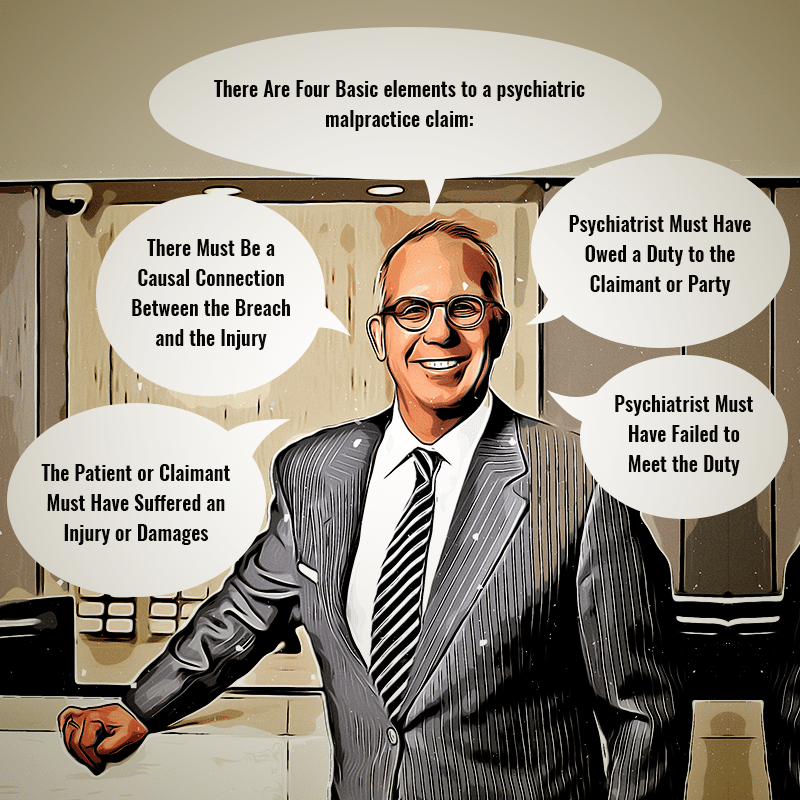Psychiatric malpractice is a type of personal injury claim that covers negligence by mental health professionals, such as psychiatrists. Psychiatrists owe their patients a standard of care that requires them to make decisions about, evaluate, and treat their patients as a reasonable psychiatrist would during their medical practice. Failure to meet this standard of care may result in emotional or physical injury to patients, for which the psychiatrist may be legally responsible. Patients have rights and are encouraged to speak with a psychiatric malpractice attorney if they believe that they were the victim of malpractice.
Table of Contents

What is Psychiatric Malpractice?
Malpractice is a type of negligence or personal injury claim that applies to those in a professional field, such as doctors, psychiatrists, and lawyers. In general terms, malpractice occurs when a professional fails to treat his or her patients reasonably or in a way that a reasonable professional would in those same circumstances, causing an injury to the patients or a third party.
Psychiatric or mental health malpractice is where a psychiatrist or mental health professional commits malpractice and causes a patient or third party to suffer from an injury or damages. In some cases, psychiatric malpractice can result in the death or serious physical harm of the patient or a third party.
The Types of Psychiatric Malpractice
Psychiatric or mental health malpractice can vary greatly, but there are general types of psychiatric malpractice.
Abuse of Power
A psychiatrist’s abuse of power includes disclosing confidential information without the patient’s consent, verbal or physical abuse, and misusing restraints.
Disclosing confidential information without the patient’s consent can be detrimental to the patient’s relationship with his or her loved ones, employer, or others. Employers or co-workers may treat the patient differently or retaliate in some way (e.g., by reducing hours) due to improper disclosure. The patient may, in turn, suffer financial and mental damages.
Verbal, physical, and sexual abuse of a patient by a psychiatrist may amount to malpractice and even criminal charges, depending on the circumstances.
Misuse of restraints is more likely to occur in an in-patient clinical or emergency room setting—such as a mental health institution. Restraining a patient improperly by having the restraints on too tight or for longer than medically necessary, if it causes the patient a physical or mental injury, is considered psychiatric malpractice.
Improper Medication Recommendations and Administration
If the psychiatrist prescribes the incorrect medication or takes a patient off medication and the patient unduly suffers as a result, the patient may have a malpractice claim against the psychiatrist. An example might be if the psychiatrist prescribed a medication to which the patient is considerably allergic according to the patient or the patient’s medical record available to the psychiatrist. If the patient suffers an allergic reaction, particularly if it is a serious reaction, then the psychiatrist’s actions may amount to malpractice.
The Effects of Psychiatric Malpractice
Mental illness disorders can range from mild or intermittent depression requiring minimal medical maintenance to mental illnesses that require almost complete dependence on psychiatrists and other medical professionals. Psychiatrists owe their patients a special duty of care to treat them with dignity and respect, and act reasonably based on the psychiatrist’s special knowledge of psychiatry.
Due to the inherently intimate nature of the mental illness, psychiatrists may be routinely entrusted with special, private information about their patients’ internal thoughts and feelings, and overall health. Elevated expectations of trust from and vulnerability experienced by their patients bring with it a potential for malpractice should the psychiatrist fail to respect the confidential nature of the patient’s information or overlook critical details that impact the proper, effective course of treatment. Because of the level of vulnerability, the effects of psychiatric malpractice can be quite significant.
Filing a Psychiatric Malpractice Lawsuit
Mental health malpractice is a personal injury claim; however, laws differ from state to state. Deadlines to file the lawsuit and what specific documents need to be filed to begin the lawsuit vary. Those who are considering filing a psychiatric malpractice lawsuit are encouraged to contact a psychiatric malpractice attorney early on to ensure that they do not miss filing deadlines. Certain deadlines, if missed, may bar the person from filing a claim in the future.

In Illinois, for example, there is a two-year statute of limitations on medical malpractice claims, meaning that the claimant would have to file the lawsuit within two years after the patient knows or should have known about the injury. In addition, there is a limitation on bringing a medical malpractice lawsuit after 4 years have passed from the date that the psychiatrist caused the injury. The exception to this is in the cases of a minor under the age of 18 years. Minors in that age group have 8 years to bring the action, or, at the latest, until they turn 22 years old.
Two Broad Categories of Errors Looked At By the Court
Errors of fact and errors of judgment are the two broad types of errors that a court might look at should the patient or the patient’s family members file a lawsuit.
Errors of fact are mistakes about important facts relating to the doctor-patient encounter. For example, if the psychiatrist fails to listen and act appropriately when a patient tells the psychiatrist that he or she has had suicidal thoughts, then this might be considered an error of fact.
Errors of judgment, in contrast, occur where the psychiatrist had relevant information, and made a judgment call based on his or her professional knowledge; however, in hindsight, that judgment call amounted to a mistake. Patients or claimants filing a malpractice claim typically have a harder time persuading the judge that an error of judgment constitutes malpractice.
Regardless of the type of error or malpractice, patients and those bringing a mental health malpractice claim are encouraged to seek the advice of a medical malpractice lawyer to help them understand their rights and the recourse available to them.
Proving Psychiatric Malpractice
There are four basic factors or elements that typically make up the foundation for a psychiatric malpractice claim: duty to the claimant, breach of duty, injury or damages suffered by the claimant, and causation between the breach and the claimant’s injury.
Psychiatrist Must Have Owed a Duty to the Claimant or Party
The psychiatrist must be or have been the patient’s psychiatrist, triggering the psychiatrist’s duty to act reasonably in treating, diagnosing, and interacting with the patient. This also includes a limited duty to third parties; particularly, a duty to notify third parties if the patient expresses imminent plans to harm him- or herself, or a third party.
Psychiatrist Must Have Failed to Meet the Duty
To be liable for psychiatric malpractice, the psychiatrist must have failed to meet his or her duty to the patient. In some cases, this duty extends to the patient’s family or third parties.
Failing to meet the duty needs to amount to something more than mere oversight; it generally must be reckless, unreasonable, or intentional conduct that deviates from what a reasonable psychiatrist would have done in those circumstances. For example, if the patient told the psychiatrist that he or she felt extremely hopeless and had imminent plans to harm himself or herself or others, the psychiatrist may have a duty to notify the authorities or a third party.
The Patient or Claimant Must Have Suffered an Injury or Damages
If the patient or claimant suffered emotionally, physically, or financially, then the patient or claimant may have a psychiatric malpractice claim. If the patient has died, the family members or heirs may file a claim on behalf of themselves or the patient.
There Must Be a Causal Connection Between the Breach and the Injury
For the conduct to be psychiatric malpractice, the psychiatrist’s failure to meet his or her duty typically must have caused the patient’s or claimant’s injury or damages. The level of causation depends on the circumstances; however, generally, the psychiatrist’s actions or failure to act must have led or contributed to the resulting injury.
Using the example given above, if the psychiatrist does not notify authorities or a third party after a patient discloses imminent plans to harm him or herself or others, and the patient follows through on those plans, then the psychiatrist’s failure may have contributed to the resulting injury.
What to Do if You Were Harmed by Psychiatric Malpractice
Information that is important for the claimant to record are things like symptoms, appointment dates and times, what was said, and what led to the injury. This information will be useful for the claimant to begin his or her claim against the psychiatrist and can assist a psychiatric malpractice attorney in evaluating the claim.
Those who were harmed by psychiatric malpractice or who are wondering if their situation qualifies as psychiatric malpractice are encouraged to seek medical attention, document the events leading up to the injury, and contact a mental health malpractice attorney.



